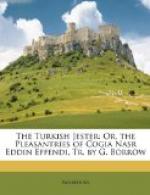One day as the Cogia was wandering amongst the tombs, by the side of the way he fell into an old tomb, and making believe as if he were dead, he said, ‘Let me see Mounkhir. Is Nekir coming?’ As he lay there stretched at his length, it appeared to him that he heard from afar the voice of a bell. ‘It is the noise of the Day of Judgment,’ said the Cogia, and forthwith sprang out of the tomb. Now it happened that a caravan was coming, and the Cogia, by putting out his head, frightened the camels, who jostled each other in great confusion. No sooner did the conductors see the Cogia than, seizing their cudgels, they said to him, ’You! Who are you?’ The Cogia said to them, ‘I am one who is dead.’ ’And what are you doing here?’ said the conductors. ‘I merely came to take a walk,’ said the Cogia. ‘We will now make you take a pretty walk,’ said the carriers, and instantly began belabouring him with their cudgels. The Cogia, with tears streaming from his eyes, ran home. ’Where have you been?’ said his wife. ‘I have been dead,’ said the Cogia, ’and in the tomb.’ ‘And what is there in the other world?’ said his wife. ‘Nothing,’ said the Cogia, ‘provided you don’t frighten carriers’ camels.’
Once upon a time the Cogia was sent into Curdistan along with the Ambassador. Whilst he was there the Curdish Beys invited the Cogia to a feast which they had made in honour of him. The Cogia, putting on a pelisse, went to the place of festival. During the entertainment he chanced to belch. ‘You do wrong to belch, Cogia Moolah Efendi,’ said the Beys. ‘I am amongst Curds,’ said the Cogia. ’How should they know a Turkish belching, even though they hear it?’
One day the Cogia went with Cheragh Ahmed to the den of a wolf, in order to see the cubs. Said the Cogia to Ahmed: ‘Do you go in.’ Ahmed did so. The old wolf was abroad, but presently returning, tried to get into the cave to its young. When it was about half-way in the Cogia seized hard hold of it by the tail. The wolf in its struggles cast a quantity of dust into the eyes of Ahmed. ‘Hallo, Cogia,’ he cried, ’what does this dust mean?’ ‘If the wolf’s tail breaks,’ said the Cogia, ’you’ll soon see what the dust means.’
One day the Cogia mounted upon a tree, and, sitting upon a branch, forthwith began to cut it. A person coming up said, ’Hallo, man! what are you about? as soon as you have cut the branch you will fall.’ The Cogia made no answer, but went on cutting, and no sooner had he cut through the bough than down fell the Cogia to the ground. Getting up, he ran after the person, crying out, ’Ho, fellow, if you knew that I should fall you also knew that I should kill myself,’ and forthwith seized him by the collar. The man, finding no other way to save himself, said, ’Leave hold of me and fling yourself down on the road face upwards. At the first belching that you give half your soul will leave your body; at the second, all will go and




